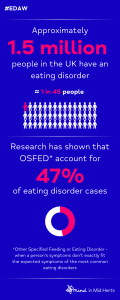Eating Disorders Awareness Week
This year Eating Disorders Awareness Week takes place between 27th February – 5th March. One of our Wellbeing Access Workers, Naomi Weinstein, is the Eating Disorder Champion for Mind in Mid Herts and wanted to highlight the importance of this week, bringing awareness to the support and help that can be accessed.
Why is Eating Disorder Awareness week so important?
Approximately 1.5 million people in the UK have an eating disorder – which is almost equal to 1 in every 45. Eating Disorders Awareness Week is an annual campaign, created to educate and inform the public about the effects of eating disorders.
The week acts as a time to celebrate people’s strength in overcoming challenges, and is also a chance for a variety of individuals to come together, including people who have experienced an eating disorder or those who have supported someone through their struggle. Increasing awareness can encourage someone to seek help, or may help those around them spot the signs quicker – which is vital for recovery.
Diagnosis and myths
Receiving a diagnosis for an eating disorder can be difficult and challenging – the use of Body Mass Index (BMI) to diagnose eating disorders is controversial, with some suggesting that its widespread use can actually contribute to eating disorders and poor body image.
It is often assumed that a person must be medically underweight to be diagnosed with an eating disorder – this is not the case. Many people also believe that eating disorders only affect women, however around 1 in 4 people with an eating disorder are men.
These assumptions can stop individuals from seeking support, as they may think that they don’t have the ‘correct’ symptoms, or their symptoms may go unnoticed by those around them. These myths can also encourage individuals to lose weight so their experience is taken seriously by health professionals and their friends and family – causing more damage to their health. Therefore, campaigns such as Eating Disorders Awareness Week are important for raising awareness that there are in fact a variety of symptoms and signs that can occur when an individual is dealing with an eating disorder, to reduce the chances of someone remaining undiagnosed and unable to access support.
Common symptoms:
- Controlling behaviour related to food, for example excessive dieting.
- Over exercising.
- Avoiding or refusing certain foods.
- Being nervous or uncomfortable whilst eating.
- Being less social with friends and family.
- Constantly checking on appearance or overly concerned about it.
- Difficulty concentrating or poor sleep.
- Recognizable changes in weight, loss and gain.
- Low in mood or changes in behaviour, for example feeling guilty after eating.
If a persons symptoms don’t exactly match the criteria of the most common eating disorders they may be diagnosed with Other Specified Feeding or Eating Disorders (OSFED). This is an umbrella term, and is an incredibly common diagnosis. OSFED accounts for the highest percentage of eating disorders, and is equally as serious as anorexia, bulimia, or binge eating disorder.
Eating Disorders can therefore be difficult to identify, as individuals with an eating disorder may experience a variety of behavioural, psychological, and physical symptoms, and one persons experience of eating disorders may be completely different to another persons. However, if you think you may have an eating disorder, or you’re worried for someone you know, a good first step is to seek help and make an appointment with the GP.
Treatment and support
There are a variety of treatment options for individuals to access which allow the person to feel supported and heard. Noticing and diagnosing the disorder with early warning is a positive step, which can then be followed by different treatment options. The most common treatment option is Cognitive Behavioural Therapy (CBT), which aims to help the individual develop techniques to manage negative behaviours or patterns. It also gives the person a chance to express their concerns and worries. Dialectical Behaviour Therapy (DBT) usually follows on from CBT, allowing the individual to gain knowledge to help them understand their feelings and emotions.
Distraction techniques:
Distraction techniques can be really helpful for getting through difficult feelings in the short term without using negative coping behaviours.
- If you’re feeling bored you might benefit from changing scenery – even just going into a different room
- If you’re feeling lonely you could put on your favourite music, podcast, radio show or audiobook as background noise, as silence can sometimes make us feel more lonely
- If you’re feeling angry, write down some good moments you’ve had or things you’ve achieved over the last few weeks – it doesn’t matter how small
It’s always worth reaching out – Beat, the UK’s Eating Disorder Charity, provides specialist UK wide support, and has a variety of really useful resources whether you have an eating disorder yourself or you would like to support someone you know.
You can visit their website, or get in touch using their helpline: 0808 801 0677 or via email: [email protected]).
Written by Chandni Ahir and Naomi Weinstein. Edited by Emma Fullerton-Frost.
Posted on: 24th February 2023